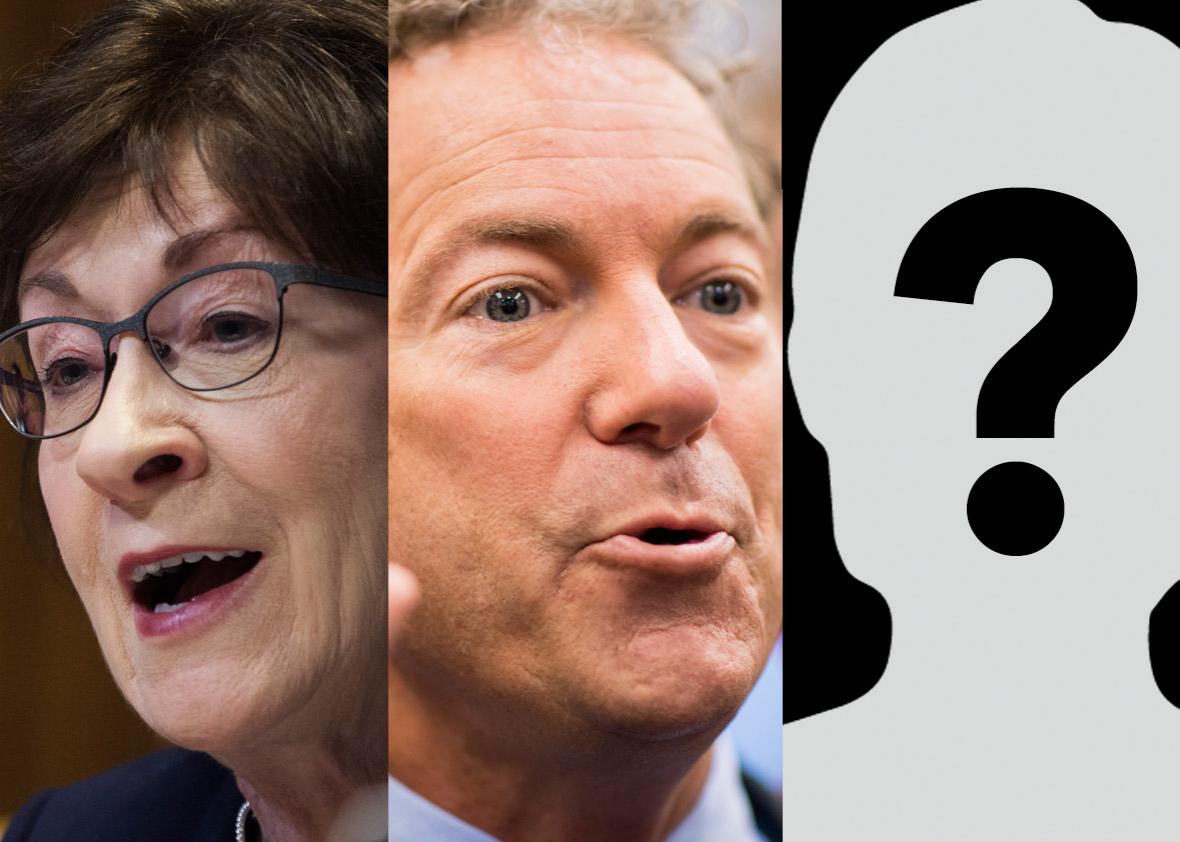Maine Sen. Susan Collins did not take very long, after seeing the new version of the Republican health care bill in a meeting on Thursday morning, to announce that she would not support it. She listed the many, many problems she still had with the bill, such as the cuts to traditional Medicaid—which remain just as they were in the first version of the bill. She would also vote no on the motion to proceed, the procedural vote that sets up debate on the bill. She is gone.
Kentucky Sen. Rand Paul also wasted no time after the meeting to declare that he, too, would vote no on the motion to proceed, from the opposite end of the spectrum. The deregulatory amendment added to appease Texas Sen. Ted Cruz, Utah Sen. Mike Lee, and Wisconsin Sen. Ron Johnson ended up pushing Paul further from the bill, because the deregulatory changes were accompanied with more federal spending to offset the negative effects the deregulation would have on those with pre-existing conditions. Paul does not support the federal government subsidizing health care and wants the bill split in two: all of the repeal elements in one, which he would support, and all of the spending in the other, which he would not support. This is not happening. He will not vote to proceed. He is gone.
A funny thing happened, though, after Collins and Paul immediately announced that they would not vote to advance the bill: No one else did.
For hours I scoured the halls of the Senate side of the Capitol trying to find one of the many senators who had trashed the bill’s Medicaid cuts to see if they, too, would vote no on advancing the bill—thus killing it. I could not find one. It is possible that a third—or more likely, a third, fourth, fifth, and sixth, together—could come out shortly after this piece is published. But consider that perhaps no third senator has come out to kill the bill because no third senator intends to kill the bill.
The new bill followed a familiar pattern that we saw with the House bill: It shifted the policy to the right, and then threw money at the problems those policy shifts would create. Cruz got his deregulatory amendment tentatively added to the bill. If the bill were to stay the same, he told a pack of reporters after the meeting, he would support it. Lee is still reviewing the bill, as the version of the amendment McConnell included was not exactly what he wanted. But the conservatives, save Paul, are closer than the moderates are.
The holdouts worth taking seriously—not, for example, Arizona Sen. John McCain—are now those moderates concerned about the bill’s treatment of Medicaid: Nevada Sen. Dean Heller, Alaska Sen. Lisa Murkowski, North Dakota Sen. John Hoeven, Ohio Sen. Rob Portman, and West Virginia Sen. Shelley Moore Capito. Their gripe is not abstract. They wanted the stingy long-term caps on Medicaid spending lifted, and they didn’t get it. But they’re not saying no yet. Each of them is officially undecided on how they’ll vote on the motion to proceed, and they all met in Sen. Mitch McConnell’s office Thursday afternoon to continue discussing.
It’s peculiar that Heller, for example, would be undecided on the motion to proceed now, after the Medicaid cuts prompted him to unload on the bill and come out as a no on the last bill’s motion to proceed. Those Medicaid cuts are still there. But after leaving McConnell’s office Thursday, Heller described their conversation as “very, very good.”
Portman and Hoeven left McConnell’s office around the same time and appeared to be on the same page about where the conversation is headed to ensure that low-income people can retain health care options. It would involve bundling the bill’s refundable tax credit money with bolstered stabilization funds to design some sort of plan for low-income people to have policies. It sounds an awful lot like the model Indiana used for Medicaid expansion. And in fact, Seema Verma, the administrator of the Centers for Medicare and Medicaid Services who designed the Indiana program along with then–Indiana Gov. Mike Pence, was sitting in at the meetings in McConnell’s office today.
So let’s imagine where we might be next week.
In one reality, all of the remaining holdout senators come out together to announce that they can’t support the motion to proceed, and the effort dies. Safety in numbers.
In another, no additional senator comes out to announce that he or she can’t support the motion to proceed. Portman, Capito, and Hoeven are convinced well enough that all of that loose money in the bill can be collected to ensure that low-income people have some sort of quasi-private options for obtaining medical care. Murkowski, who got a carve-out in the bill released Thursday, accepts it. McConnell assures Heller that he’ll make all the necessary phone calls on his behalf to help him find good-paying private-sector work come January. The Congressional Budget Office score comes out, and it’s not great, but since President Donald Trump’s Health and Human Services Department will be scoring the Cruz amendment instead of CBO, the worst of the bill’s effects on those with pre-existing conditions will be masked. The bill proceeds to the floor, a vote-o-rama of amendments occurs, McConnell cleans the bill up at the end, and the bill passes.
Any third Republican senator could have given a press conference Thursday afternoon and killed the bill. But it didn’t happen. Instead of finding their exit ramp off the bill, they’re trying to find their way to yes.
